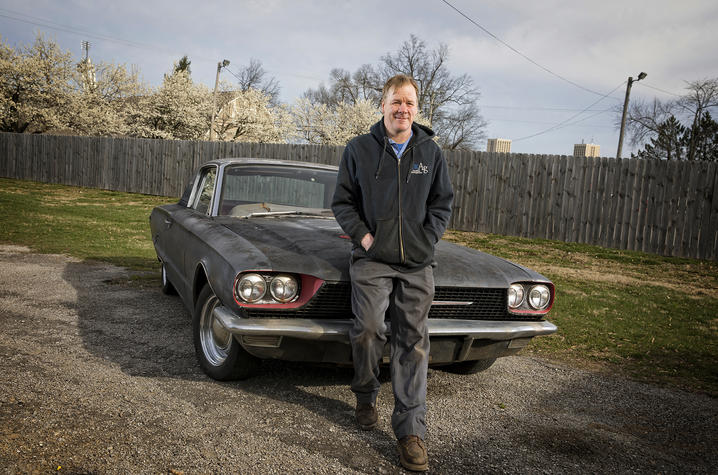UK Teamwork Returns Heart Patient to His First Love: Restoring Vintage Cars
LEXINGTON, Ky. (Mar. 16, 2017) — By his 13th birthday, Jason Conn had undergone three open heart surgeries to repair his deformed bicuspid valve.
Conn missed quite a bit of school as a result, but was fortunate to have dedicated teachers who came to the house for tutoring so that he wouldn't fall behind. While he was cleared to enjoy typical childhood activities like skateboarding and bike riding, he was not allowed to play organized sports.
"My biggest disappointment was when my cardiologist told me that I probably couldn't be a race car driver," the Ohio native says with a smile.
Conn was declared "cured" by his cardiologist and had, by his own account, a normal young adult life with few health problems. Eventually Conn moved to Lexington, where he is now in his 11th year as a University of Kentucky employee in the College of Agriculture, Food and Environment, and began a lifelong love affair restoring vintage cars and motorcycles.
"I have actually seen junked cars in people's yards and stopped to ask whether I could buy them," the 41-year-old said. His current obsessions are a 1978 Fiat Spyder and a 1968 Ford Thunderbird that he purchased from an Eastern Kentucky motorcycle church.
However, Dr. Andrew Leventhal, director of the Kentucky Adult Congenital Heart Program (KACH) at the Gill Heart and Vascular Institute, cautions that no one with a congenital heart defect is technically "cured."
"Almost all congenital heart defect repairs should be followed by a cardiologist for a lifetime," Leventhal said.
Jason Conn learned this the hard way.
In late 2015, Conn developed a cough and fatigue that persisted all winter despite multiple rounds of antibiotics. By March, he could hardly muster the energy to walk the block from his house to the shop where he works behind Commonwealth Stadium.
"I had been losing weight, but at the time I didn't think much about it," he said. "When I went back and looked I realized that I had been taking a lot of sick days."
When Conn developed chest and abdominal pain, he came to UK HealthCare's Good Samaritan Hospital and mentioned his prior medical history to Leesa Schwarz, the KACH nurse practitioner. Schwarz alerted Leventhal, who ordered an echocardiogram to assess the structure and function of Conn's heart.
"The echo revealed an abscess on Jason's aortic valve, which explained why he was still having fevers despite repeated rounds of antibiotics," Leventhal explained.
Conn had developed endocarditis – an infection of the heart's inner lining. People with damaged heart valves, artificial heart valves or other heart defects are prone to endocarditis, and it can have deadly consequences, including stroke, organ damage, and/or heart failure. In Conn's case, he had an infarcted spleen, brain aneurysms, and emboli in his foot causing nerve damage.
Leventhal knew that Conn needed a cardiologist with a keen clinical sense and an understanding of the complexities that his condition presented. He immediately called Gill Heart and Vascular Institute colleague Dr. Hassan Reda, an experienced surgeon who specializes in the treatment of diseased aortic valves, including congenital conditions.
In a 15-hour marathon surgery, Reda removed the infected tissue from around Jason's heart and restored aortic valve function with a donor valve.
"Jason's condition required a complicated multi-step team approach, including a skilled neurointerventionalist to treat his infected brain aneurysms, a delicate fourth-time reconstruction of the aortic root, and attentive ICU/nursing care, "Reda said. "This sort of teamwork is a routine occurrence at the Gill."
Conn began cardiac rehabilitation immediately after discharge and was back at work full-time by early July. "I feel terrific," Conn says. "I've gained back all the weight I lost and am strong enough to carry tires and other heavy stuff."
According to Leventhal, adults who were born with heart defects face unique challenges. "It wasn't that long ago that children with heart defects didn't survive to adulthood," he explained. "Technical advances in cardiac surgery have improved outcomes dramatically, but that presents a new issue: patients who reach adulthood have outgrown their pediatric cardiologists and the facilities that provide treatment – typically children's hospitals. But simply transitioning to an adult cardiologist isn't the best fit either, since their heart problems can be very different from cardiac conditions that begin during adulthood."
Leventhal is among an elite group of cardiologists with special training to recognize and treat the issues that affect adults who have survived with congenital heart defects. He heads a talented group of physicians and staff at the Gill's KACH Program, which draws patients from all over Kentucky and West Virginia.
"People like Jason require a lifetime of follow-up care to ensure that their defect repair is sound," Leventhal said. "If you had heart surgery as a child, be sure your doctor knows about it, and find a cardiologist who's trained to help in situations like these."
Conn calls his recent adventures the "ultimate medical detective story" and is grateful that Leventhal was following his case so closely.
"It's really a miracle," Conn said. "I get to work here, and I get the best care here. I can't imagine a better place to be."





